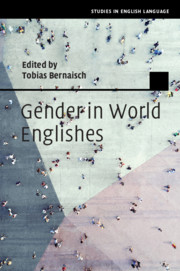Book contents
- Gender in World Englishes
- Studies in English Language
- Gender in World Englishes
- Copyright page
- Dedication
- Contents
- Figures
- Tables
- Contributors
- Chapter 1 Introduction
- Chapter 2 Localisation, Globalisation and Gender in Discourse-Pragmatic Variation in Ghanaian English
- Chapter 3 Sociolinguistic Variation in Intensifier Usage in Indian and British English
- Chapter 4 Tag Questions and Gender in Indian English
- Chapter 5 Hedges and Gender in the Inner and Expanding Circle
- Chapter 6 The Role of Gender in Postcolonial Syntactic Choice-Making
- Chapter 7 Social Constraints on Syntactic Variation
- Chapter 8 Linguistic Colloquialisation, Democratisation and Gender in Asian Englishes
- Chapter 9 Gender, Writing and Editing in South African Englishes
- Index
- References
Chapter 5 - Hedges and Gender in the Inner and Expanding Circle
Published online by Cambridge University Press: 11 December 2020
- Gender in World Englishes
- Studies in English Language
- Gender in World Englishes
- Copyright page
- Dedication
- Contents
- Figures
- Tables
- Contributors
- Chapter 1 Introduction
- Chapter 2 Localisation, Globalisation and Gender in Discourse-Pragmatic Variation in Ghanaian English
- Chapter 3 Sociolinguistic Variation in Intensifier Usage in Indian and British English
- Chapter 4 Tag Questions and Gender in Indian English
- Chapter 5 Hedges and Gender in the Inner and Expanding Circle
- Chapter 6 The Role of Gender in Postcolonial Syntactic Choice-Making
- Chapter 7 Social Constraints on Syntactic Variation
- Chapter 8 Linguistic Colloquialisation, Democratisation and Gender in Asian Englishes
- Chapter 9 Gender, Writing and Editing in South African Englishes
- Index
- References
Summary
Women have often been profiled as prototypical users of hedges, i.e. linguistic devices such as I believe lowering the pragmatic force of a statement to potentially save interlocutors’ faces. Still, empirical investigations of gender-preferential hedging as employed by learners – specifically in postcolonial territories – are not available. This study establishes corpus-linguistically a) whether men or women use more hedges in native-speaker and postcolonial learner contexts, b) what factors determine hedge choice and c) on a theoretical level, the relation between learners and the evolutionary progress of their postcolonial habitat. A total of 1,530 hedges are extracted from texts by British native speakers and by learners (maximally level B1 in the Common European Framework of Reference for Languages) from Hong Kong, the Philippines and Singapore. Males use more hedges in Britain and Singapore, while female learners employ more hedges in Hong Kong and the Philippines, but the concrete hedge chosen is determined by region – with Singapore being notably different from other territories – mode and gender. More generally, the findings suggest that speaker status differences, i.e. whether speakers are second-language or foreign-language users, may be less important in explaining linguistic choices than the evolutionary status of their sociolinguistic habitat.
Keywords
- Type
- Chapter
- Information
- Gender in World Englishes , pp. 94 - 120Publisher: Cambridge University PressPrint publication year: 2021

